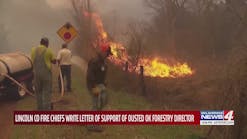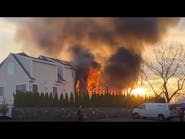When Kelvin Cochran first embarked on his college career in 1981, little did he know that four years of study would take nearly two decades to complete. The former U.S. Fire Administrator and current Atlanta, GA, Fire Rescue Department chief’s college career – robust at first – sputtered to a halt.
“I started out strong,” Cochran said. “I was focused…I was going to college at Louisiana Tech University to become an architect. In the first two quarters, I was doing well. And then I realized I didn’t have enough mathematics in high school to manage the math requirements of the program. Second, I lost my focus – I started partying and having a good time rather than working on my classes. I found myself on academic probation the following year.”
But a mentor, maturity and beginning a family gave Cochran a new sense of urgency. “There was a retired chief training officer by name of George Carney, who was then working at General Motors in Shreveport,” Cochran said. “He asked me one day what I had planned for my next career move. At the time, I was assistant chief of training. I told him I was planning to succeed the current chief of training, in about five years. He told me that my vision was too low and that I needed to be planning to be the fire chief of the department. He asked me if I had a college degree, and I said no. He said I needed to get that right away because the future will be here before I know it.”
Cochran said this nudge by the well-respected chief provided a sense of urgency in pursuing a bachelor’s degree. He attended Wiley College, where he received a bachelor’s degree in organizational management in 1999, the same year he was appointed Shreveport’s fire chief. In just a few years, his expanded vision gained clarity. “Had I not had my bachelor’s degree, I would not have been appointed fire chief…because of the competition for the job,” he said. “So you can say I achieved my bachelor’s degree just in the nick of time.”
Yet Cochran’s desire to move his professional career to a higher level continued to propel him into an advanced degree.
“I had developed a hunger for higher education, but it was difficult because I was extremely busy with my children, who were in high school,” he said. “I had all the excuses in the world not to go back to college, but I went back to Louisiana Tech University and pursued a master’s degree in industrial and organizational psychology. Because of my workload and family commitments, I took one course per quarter; it took me two years, but I completed the degree. I vindicated myself...That was a tremendous feeling of accomplishment for me.”
Meeting Goals
Matt McNabb, a corporal at Oklahoma City, OK, Fire Department, became a firefighter in the U.S. Air Force after high school. Because of his veteran’s benefits and an educational partnership with the University of Maryland, he started early on his bachelor’s degree. “I could see at that point that a lot of firefighters did not have advanced education,” McNabb said. “I started to see where other people – I won’t say looked down on them – but some perceived us as just the muscle out there…and not educated. I didn’t agree with that.”
McNabb found his enthusiasm tempered by his peers’ reaction.
“About 60% gave me a hard time for a variety of reasons – like ‘So, are you going to be the next chief?’ And the other 40% liked the idea and wanted some advice on how to attend college,” he said. “Those with more years in the fire service, especially higher-ranking personnel, provided less support, while those on the other end of the spectrum – the newer generation – were more open about it and supportive.”
McNabb continued to excel academically as his fire career moved into the public sector. He recently completed a master’s degree in fire and emergency management administration at Oklahoma State University.
“A lot of people who are not that familiar with the fire service think that it consists of basically vocational training and muscle – you don’t need education,” he said. “I would like to tell them that the fire chief I work for manages a $100 million budget and more than 1,000 employees. You can’t tell me that someone in his position doesn’t need more than vo-tech training.”
McNabb has met one of his goals: He now teaches college courses to primarily fire service personnel. “To me,” he said, “that’s about the most rewarding thing – to teach the associate’s- and bachelor’s-level courses to people who are trying to get into the fire service or who are already in the fire service. We talk the same language. To expand the credibility of those teaching fire service courses is important to me.”
Standing Out
Joe Bruce jokingly refers to his initial college experience as his “20-year plan.” The chief of Colorado’s North Metro Fire Rescue District took his first college course in 1977, shortly after leaving the Air Force. He was awarded a bachelor’s degree in 1998.
“When I was in the Air Force in the Upper Peninsula of Michigan, Northern Michigan University offered an associate’s degree in fire science,” Bruce said. “One of the first classes I took was building construction for the fire service. I really enjoyed it…and took some more classes. But I was one of those guys who didn’t really look at a degree plan, I just kept taking classes.”
Eventually, Bruce made his way to Colorado.
“At the time, I was in fire inspections, so I took a fire inspection class at Red Rocks Community College,” he said. “Then I took a codes class. I was looking at college for my own job improvement. Initially, it wasn’t necessarily about getting a degree, it was more about how I saw it set others apart and how it (helped them) do their jobs. Higher education gets a bad rap because it’s referred to as ‘book knowledge.’ This is in contrast to the guy with great field knowledge, such as someone who is a good incident commander. But I don’t think you can separate the two.”
He continued, “What really struck me was when I looked at people in the fire service – remember, this was in the late ’70s – the people who had received their degrees seemed to stand out. I could tell there was a difference in their perspective, the way they looked at things, their critical thinking – their networking awareness.”
Using Time Wisely
Ken Treffinger, special operations manager and volunteer coordinator at the Sarasota County, FL, Fire Department, recently decided to head back to college at American Public University after attaining an associate’s degree in fire protection technology from Monroe Community College in 1990.
“I would advise someone that even though you might not need a degree currently, it’s something that you can always use and will always have, even if you’re not really sure you want to take the steps to get it done,” he said. “Use your time wisely; make sure you have good time-management skills, especially the older you get in life. Family issues you will accumulate will make it more difficult to successfully manage your time.”
Although Treffinger has 20 years in the emergency services, he is new to his administrative position.
“Now that I’m getting into the administrative side of the job,” he said, “I feel that higher education is needed primarily to learn techniques to better deal with people. Also, learning budgets, grants and other aspects of administration will help greatly. With the technical knowledge, the addition of higher education will allow me to learn and grow on the administrative side. I think it adds to the credibility of the position and the person.”
Part of the challenge he faced was finding the right college program from the growing number available.
“Identifying where you want to go and what you want to get out of the program – doing your research in terms of accreditation – are all important,” he said. “From what I learned as I continue my career, regional accreditation is essential for the possibility of advanced programs such as the EFO (Executive Fire Officer) at the National Fire Academy or using my bachelor’s degree for an advanced degree. Regional accreditation is pretty much mandatory. You might be able to get a good education from an organization that is not regionally accredited, but what’s the reason?”
Mapping a Path
Michael Jackson carefully searched baccalaureate programs and chose Eastern Kentucky University. The chief of the Woodland, WA, Fire Department was a traditional student as an undergraduate, but now plans to pursue a master’s degree.
“After high school, I went to Eastern Kentucky University to pursue my bachelor’s degree in fire protection administration,” he said. “I continued to volunteer at a fire department while I was in college. I also had three internships at two departments while I was in college, where I took on some special projects.”
Jackson recognizes the need for higher education to further his career.
“When I look at long-term advancement – I’m pretty young for my position compared to most folks in the area – I see that this would be a good way to improve my career path,” he said. “…And maybe end up teaching at some point.”
He sees the common use of consulting firms to search for upper-level fire service positions, especially prevalent in Washington State, as an advantage to departments. “The use of search firms to fill the upper ranks of fire departments opens the field more and makes it more competitive,” he said. “Internally, folks see that they must compete with those outside of the department. But I see it as a call to rise to the challenge. If folks inside a department can’t compete, then they need to step up and become competitive. It’s helpful to bring a fresh perspective to any department.”
Jackson maintains ties to his alma mater, Eastern Kentucky University, where he converses with people with similar backgrounds. “It’s a huge connection and a way to stay involved,” he said. “I also look at the momentum of FESHE (the federal Fire and Emergency Service Higher Education model) and where it’s going as a source of inspiration and motivation. It’s also a great idea-sharing forum. The EFO program too has been beneficial because those people tend to be proponents of higher education.”
Jackson believes higher education is vital to the continued growth and credibility of the fire service.
“The industry is becoming more attuned to higher education,” he said. “To be competitive, people need to embrace higher education or face the possibility of being left out in the future. If you do not have an education and are competing with those with an education, then it becomes more difficult. Higher education is our only hope to being truly recognized as a profession.”





